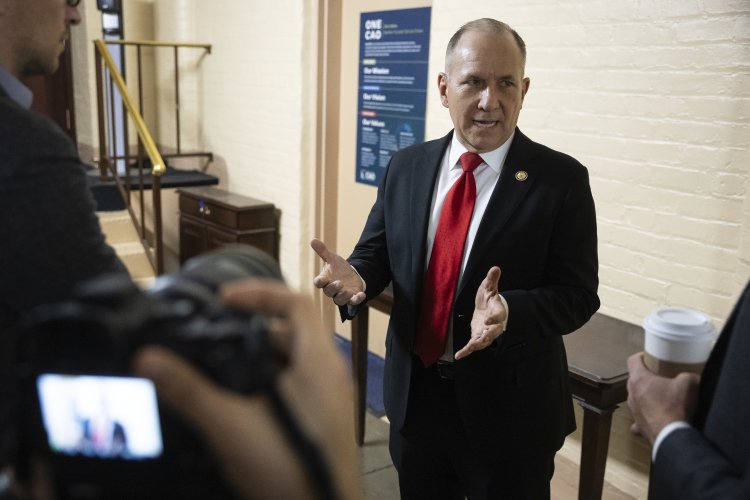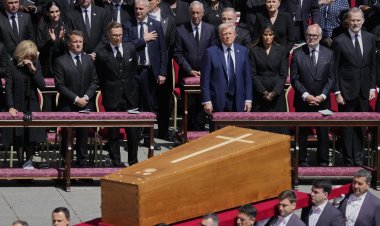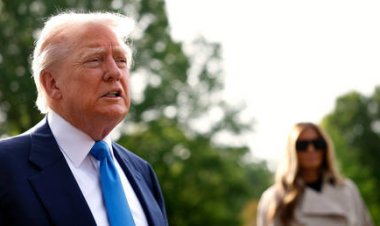Lloyd Smucker Insists GOP Spending Cuts Must Be Beneficial
The Pennsylvania Republican demonstrates that the desire for fiscal discipline extends beyond the typical figures associated with the hard right.

However, that may be changing.
As a staunch fiscal conservative, Smucker has recently stepped into a significant role during crucial negotiations concerning the GOP's legislative agenda, joining forces with the prominent members of the Freedom Caucus to advocate for substantial cuts in federal spending.
Last month, he successfully pushed through a budget amendment aimed at achieving an additional $500 billion in cuts over the next decade, contingent upon Republicans following through with a comprehensive suite of proposed tax reductions. This week, he participated in a contingent that delayed final budget approval until Speaker Mike Johnson, Senate Majority Leader John Thune, and former President Donald Trump provided more definitive commitments to reducing federal expenditures.
On Thursday morning, Smucker and the other holdouts agreed to finalize the budget plan, allowing progress on the extensive domestic policy megabill that could affect many aspects of federal governance, including taxes, health care, border security, and military funding. Nevertheless, they indicated that they will not be sidelined as the final bill takes shape.
“We’ve got to reduce spending to put the country on a better path fiscally,” Smucker stated in a recent interview. “I think the disagreement is, some of us really believe that the [budget plan] is an important foundation on which to build a good bill. And so we want to ensure that some of the principles that all of us agreed to are included.”
Smucker’s recent involvement in budget negotiations sends a clear message to GOP leadership: the demand for significant spending cuts extends beyond the typical MAGA right figures. Although he is a committed conservative, he is also known for his collaborative approach within Capitol leadership and among lobbyists in Washington.
“He’s just a man of principle and deep conviction and that principle and conviction intersected with our colleagues in the Freedom Caucus,” remarked House Budget Chair Jodey Arrington in an interview following the budget vote.
Holding a vital seat on the tax-writing Ways and Means Committee, Smucker is also part of the usually quiet Budget Committee, which has become essential due to its role in crafting fiscal instructions for budget reconciliation—an expedited process enabling Republicans to bypass a Democratic filibuster in the Senate.
Suddenly, Smucker finds himself wielding significant influence as a key intermediary among important committees, party leadership, and hard-liners, providing him with a unique opportunity to fulfill the promises of small government and fiscal responsibility upon which he campaigned since his first election in 2016.
“He was an absolute warrior in this process,” noted Arrington. “We wouldn't have gotten the commitments to a fiscally responsible budget reconciliation bill if Lloyd Smucker was not involved and leading.”
Smucker and Arrington worked to establish a strict cap of $4.5 trillion on tax cuts—considerably lower than the $5.5 trillion mentioned by Ways and Means Chair Jason Smith as necessary to achieve all of Trump’s campaign promises. Smucker also designed an amendment that limits the amount of tax cuts Smith can implement if the GOP fails to achieve at least $2 trillion in spending reductions.
This week, he advocated for a budget amendment that would closely connect tax cuts with spending cuts, setting a cumulative spending cut target of $2 trillion; if Republicans fell short, the available funds for tax cuts would be reduced accordingly.
GOP leaders, however, rejected further modifications to the budget framework, which would have necessitated another lengthy debate and voting in the Senate. Nonetheless, Johnson did sign a memorandum committing to “maintaining linkage between provisions that result in a deficit increase... and provisions that reduce federal spending” and providing a “fiscally responsible product.” He even placed his own job on the line in a private meeting as collateral.
“The commitment we received, which I based my vote on, was that we would go beyond what the Senate had included in their instructions,” Smucker explained after casting his vote in favor of the Senate-approved plan. “That floor of $4 billion was unacceptable to all of us that were part of this group.”
This group is asserting that they will maintain unity as the potentially complicated process of assembling the megabill continues. Smucker is not the only unconventional ally in this collaboration, as Rep. David Schweikert of Arizona, another fiscally disciplined member of Ways and Means, also participated in the holdout coalition advocating for substantial spending reductions.
The unity of fiscal hawks beyond the typical hard-right figures presents a challenge for House GOP leaders and Trump, who are trying to balance various factions of the party while crafting an acceptable bill.
Smucker pointed out that with Republicans controlling all three branches of government, there exists a critical opportunity to act on the party’s longstanding commitment to curbing spending and improving the nation’s fiscal outlook.
“If we don’t change course, we’re going to see some sort of economic calamity, some sort in the not-too-distant future, in my opinion,” he remarked. “So I think this is our opportunity to at least take the first step towards fiscal sanity.”
Jessica Kline for TROIB News












